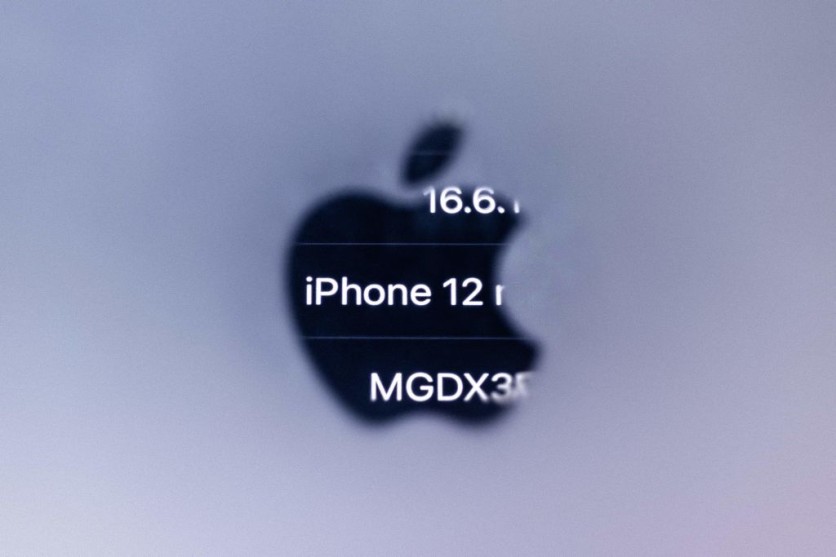Good news for iPhone enthusiasts in France: the iPhone 12 is set to make a legal comeback. This turnaround is courtesy of a significant update integrated into iOS 17.1. The update serves to align the iPhone 12 with the stringent French electromagnetic emissions test protocols.

(Photo : JOEL SAGET/AFP via Getty Images)
This illustration photograph taken on September 13, 2023 in Paris with a macro lens shows reversed information of an iPhone 12 reflected in the Apple logo of an iphone.
Addressing French Radiation Concerns
Apple announced on Tuesday its intentions to adhere to France's radiation testing standards by introducing an update that prevents the iPhone 12 from increasing power usage when it makes contact with static surfaces.
New York Post reported that this move follows a dispute between Apple and French regulators, who alleged that the three-year-old iPhone 12 exceeded the allowable radiation limits, prompting a suspension of its sales in France.
In an extensive explanation provided by Apple via a website article, the company addressed the disparity between France's findings and the approval for iPhone 12 sales in other countries.
Apple clarified that iPhones have been equipped with sensors for over a decade to detect proximity to a user's body, allowing the device to maintain lower transmission power levels in such instances. However, the testing protocol employed by L'Agence Nationale des Frequences did not account for this feature.
Consequently, Apple is releasing a software update, available to French users this month, which deactivates the body-detection technology, ensuring the phone consistently operates at lower transmission power levels.
Apple assured users that the iPhone 12 remains safe for use, even without the forthcoming software update. The company emphasized that the iPhone 12 was originally certified to meet global energy transmission regulations and standards upon its release in 2020, and no alterations have occurred that would impact its energy transmission capabilities.
Imposing a Temporary Ban
Back in September, France imposed a temporary ban on the iPhone 12 following a specific absorption rate (SAR) test conducted by Agence nationale des fréquences (ANFR), the nation's regulatory authority for radio-frequency emissions. The test, which assessed 141 phones, revealed that the iPhone 12 exceeded the allowable limit for on-body emissions.
The Verge reported that SAR is a measure of the energy absorbed by the body from radio-frequency electromagnetic fields, with limits varying from country to country. In the United States, the Federal Communications Commission (FCC) governs these limits.
Apple expressed its position in a rather reserved manner, emphasizing that the iPhone 12 indeed adheres to on-body Specific Absorption Rate (SAR) limits when it's being worn or carried. This is achieved through on-body detection, which allows the device to lower its transmission power accordingly.
However, Apple pointed out that the ANFR's testing protocol necessitates compliance with on-body SAR limits even when the device is tested in an off-body state on a static surface.
Also Read : Are iPhone 12 Users at Risk of Radiation? Belgium Investigating Phone to Ensure People's Safety
Phone Arena reported that the iPhone 12 had been temporarily removed from the French market, although Apple was already planning to discontinue its sales in the country. Other European nations also followed the situation with interest.
In response, Apple informed Reuters in September that it was actively developing a software solution to ensure that the iPhone 12 could pass the specific test protocol of the ANFR. French regulators granted approval on September 29th, and the solution will be integrated with iOS 17.1.





